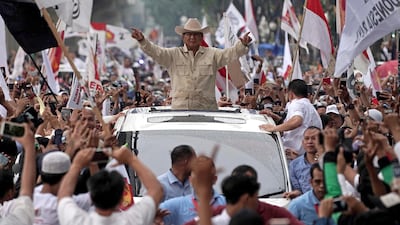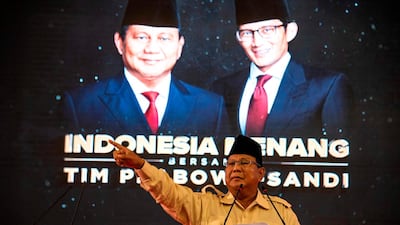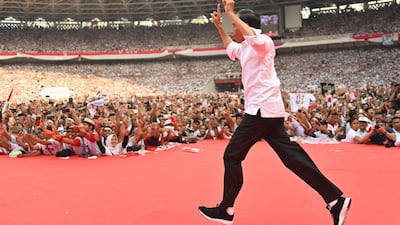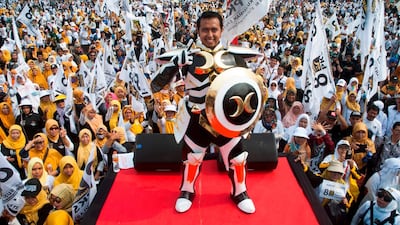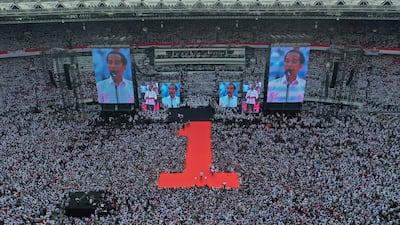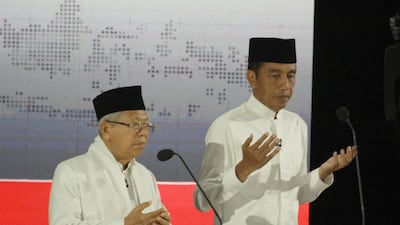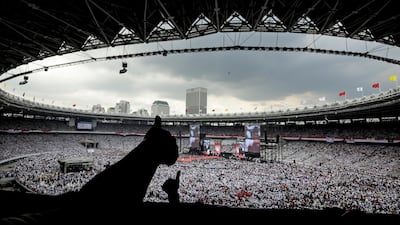Indonesia, the world's most populous Muslim-majority nation, will go to the polls on Wednesday, with President Joko Widodo standing for re-election against populist ex-general Prabowo Subianto.
More than 192 million Indonesians at home and abroad will vote in presidential and parliamentary elections, in what has been described as the world's biggest single-day elections.
Overseas voting was already underway on Sunday, with thousands lining up outside Indonesian missions in Singapore and Australia.
Nearly 500,000 police and military will fan out across the vast archipelago to safeguard the vote. In Jakarta, the capital, officers will guard polling stations to deter voter intimidation or clashes, national police spokesman Dedi Prasetyo said.
When do Indonesian polling stations open and how does voting work?
On Wednesday, polling stations will open at 7am local time in eastern Indonesia (2am UAE) and close at 1pm (10am UAE) on the western side of the country. Voters will manually punch five separate paper ballots for president and vice president, and legislative candidates.
Unofficial "quick counts", based on vote samples from polling stations, will be released hours after polling ends and the winning presidential candidate is expected to be apparent by late Wednesday.
The General Election Commission is expected to announce an official result in May.
Candidates have 72 hours after the official result to complain to the Constitutional Court. A nine-judge panel has 14 days to reach a decision, which cannot be appealed.
Who is Joko Widodo (Jokowi) and what does he stand for?
A former furniture salesman who launched his political career as a small-city mayor, the incumbent Mr Widodo is standing for re-election after almost five years in power. His party is the PDI-P (the Indonesian Democratic Party of Struggle)
Mr Widodo has touted a record infrastructure drive and deregulation as major successes during his tenure, calling them first steps towards tackle inequality and poverty in Southeast Asia's biggest economy.
Five years ago he set a target of 7 per cent annual GDP growth, but volatile markets and weak commodity prices limited growth, which sat just above 5 per cent for most of his term.
His economic reforms, including easing foreign ownership rules, saw Indonesia's credit rating upgraded by three credit agencies – Moody's, S&P and Fitch.
In a televised weekend debate, Mr Widodo and his running mate, Islamic cleric Ma'ruf Amin, said their opponents, neither of whom has served in public office for more than a few months, did not understand managing macro level economics.
Mr Widodo, a moderate Muslim from central Java, has had to burnish his Islamic credentials after smear campaigns and hoax stories accused him of being anti-Islam, a communist or too close to China, all politically damaging charges in Indonesia.
For his second term Mr Widodo has promised to continue his infrastructure building programme and improve the country's education programme.
Who is Prabowo Subianto and what does he stand for?
The former military general commonly known as Prabowo is a millionaire businessman and was the son-in-law of former dictator Suharto before his divorce from Suharto's daughter Titiek. He is leading a coalition of parties including his own Gerindra (Greater Indonesia).
He has taken a populist approach during the campaign, repeatedly warning Indonesia is on the verge of collapse and giving fiery speeches about how the country is being pillaged by foreigners and the elite.
Mr Subianto, who has close links to what have been described as hardline Islamist groups, and his running mate, business tycoon Sandiaga Uno, have pledged to boost the economy by slashing taxes as much as 8 per cent, and focus on key infrastructure projects.
Mr Subianto has also promised to crack down on corruption, reduce electricity prices, create more jobs and, echoing US President Donald Trump, make Indonesia great again.
Who is most likely to win?
Most opinion polls give Mr Widodo a double-digit lead but the opposition has disputed survey findings, releasing polling that it says shows Mr Subianto will win.
It has also said it has uncovered data irregularities affecting millions on the electoral rolls and has vowed to take legal action or use "people power" if its complaints are not resolved.
A senior government official told Reuters the polls can not be taken for granted.
"Absolutely everybody is flying blind because we don't know how far the opinion polls can be respected," said the official, who spoke on condition of anonymity.
In 2014, when the same candidates faced each other at the last election, Mr Subianto refused to concede defeat for two weeks.
Could millennials tip the vote in Indonesia?
With a young population, more than one-third of Indonesia's voters are under the age of 35, making the millennial vote incredibly important to the 2019 election.
Ross Taylor, President of Australia's Indonesia Institute, said the result could depend on the youth vote.
"At this stage Jokowi seems 'certain' to win but when you consider some 90 million of eligible voters are millennials and many are undecided if they will even vote, the election could be much closer than anticipated," Mr Taylor told The National.
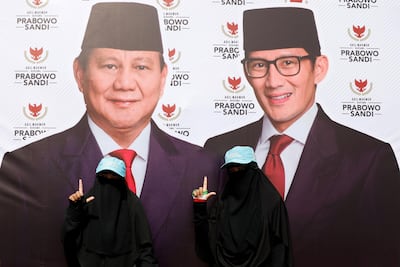
He said Mr Subianto's running mate, Mr Uno, was young, wealthy and dynamic: "He has a huge following from young Muslim women; rock star status."
Ben Bland, Director of the Southeast Asia Project at the Lowy Institute in Sydney, also noted that Mr Uno had played a big role in attracting the youth vote.
"In a lacklustre campaign, Sandiaga Uno has often seemed to be the only candidate proactively running for office," he wrote in a report published ahead of the election. "The 49-year-old businessman, who is by far the youngest of the four candidates, has regularly posted images of himself jogging, swimming and playing basketball during his non-stop trips around the country.
"His infusion of energy has helped the Prabowo campaign generate buzz from the mainstream media and attract younger voters on Facebook and Instagram, which have a wide, enthusiastic, and growing user base in Indonesia."
Despite this, Mr Bland said it was hard to find a political expert in Indonesia who could see a viable path to victory for Mr Subianto.
"Jokowi has all the advantages of incumbency," he said. "He has the vast machinery of government behind him and has won the support of most of Indonesia’s major media owners, who are keen to keep good relations with the man they expect to win."



